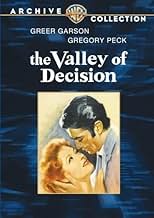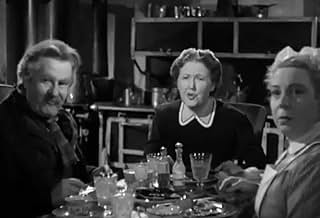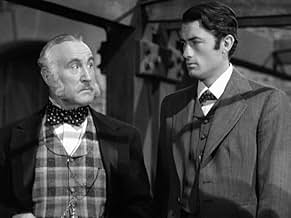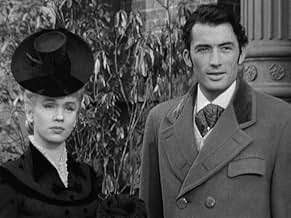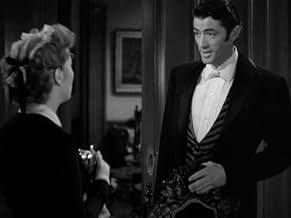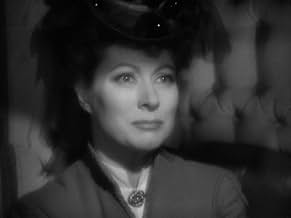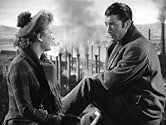NOTE IMDb
7,3/10
2,6 k
MA NOTE
Ajouter une intrigue dans votre langueAn Irish maid falls for the son of her wealthy boss, though their disapproving fathers and a bitter strike at the steel mill complicate matters.An Irish maid falls for the son of her wealthy boss, though their disapproving fathers and a bitter strike at the steel mill complicate matters.An Irish maid falls for the son of her wealthy boss, though their disapproving fathers and a bitter strike at the steel mill complicate matters.
- Réalisation
- Scénario
- Casting principal
- Nommé pour 2 Oscars
- 4 victoires et 2 nominations au total
Avis à la une
This is a fine historical-era drama, about a Pennsylvania mill-town. In this absorbing drama, which is only one book of a monumental Catholic work by Marcia Davenport, Greer Garson plays a pretty and bright young woman who takes a job in the lavish home of a Pittsburgh steel magnate, played honestly and strongly veteran actor Donald Crisp. Gregory Peck plays one of his sons, the serious one, who is devoted to his father's mill and who works alongside some of the mill workers, including his friend Preston Foster. The father has two other sons--Dan Duryea, who is more desirous of having money rather than of working; and Marshall Thompson, who has turned to alcohol in his unhappiness...There is also a daughter played by the fine actress Marsha Hunt, perhaps one of her best performances. Gladys Cooper plays the matriarch of the family, who befriends Garson, and leaves her her shares in the mill. Garson's father, played with skill by Lionel Barrymore, is an embittered man, who lost the use of his legs in an accident in the mill, and did not want his daughter working for the owners. It is he who begets violence that has tragic consequences. Jessica Tandy plays Peck's wife, a bitter woman; Peck should have married Garsop all along, of course; but the climax of the film is the troubles at the steel mill that are started by the angry workers and the consequences on all concerned of this violent crisis action. There are many finely-developed characters in this long film, but I sense also a fair sense of fatality about the events, intended by the author, against which the attraction of persons, characters and dispositions of Peck and Garson are played, like two rays of sunlight illuminating a dark jungle's zone. Thiis attractive B/W production was directed by Tay Garnett. Marcia Davenport long novel was adapted to the screen by fine scenarist Sonya Levien and John Meehan. The cinematography for the film was the work of Joseph Ruttenberg and Herbert Stothart composed the dramatic score. When I say that the art direction was done by Cedric Gibbons with Paul Groesse, the set decorations by Edwin B. Willis and the costume designs by Irene, I have accounted for the film's very-opulent and vivid production values. In the cast apart from the principals already mentioned, one can see Barbara Everest, Geraldine Wall, Eveline Dockson, John Warburton, Rusell Hicks, Mary Lord, Arthur Shields, young Dean Stockwell, Maru Courier, Lumsden Hare, Connie Golchrist and Anna Q. Nilsson. This is always an attractive and a carefully-considered production, which occasionally seems to me to lack warmth; with a great script, everyone concerned could perhaps have produced a masterpiece. With the one they had, the talents involved produced a memorable adventure that rises on occasion to first-rate dramatic heights. Not to be missed, perhaps. I would love to see it redone, with another fine cast; more than melodrama, it has I believe as a writer, an important dramatic potential.
Greer Garson, with a terrific Irish brogue, earned still another Oscar nomination. With the exception of 1940, Miss Garson was nominated for best actress from 1939-1945, a Hollywood record.
The film depicts the old problem of wealth vs. poverty. A pretty and pert Greer goes to work for the family of Gregory Peck. They are lovely, unpretentious people. Her dad, played by the irascible Lionel Barrymore, is a hot head if ever there were. His hot-headedness will ultimately lead to his downfall as the film goes on.
We see wealth and snobbery associated with it, especially by Peck's wife, brilliantly played by a young Jessica Tandy. In a change of pace, veteran movie mother, Gladys Cooper, comes off as a wonderfully, kind sort of matriarch married to the indomitable Donald Crisp.
The ending is great. All I can say is that fairness triumphs over snobbery. Class distinctions just seem to go away.
The film depicts the old problem of wealth vs. poverty. A pretty and pert Greer goes to work for the family of Gregory Peck. They are lovely, unpretentious people. Her dad, played by the irascible Lionel Barrymore, is a hot head if ever there were. His hot-headedness will ultimately lead to his downfall as the film goes on.
We see wealth and snobbery associated with it, especially by Peck's wife, brilliantly played by a young Jessica Tandy. In a change of pace, veteran movie mother, Gladys Cooper, comes off as a wonderfully, kind sort of matriarch married to the indomitable Donald Crisp.
The ending is great. All I can say is that fairness triumphs over snobbery. Class distinctions just seem to go away.
This MGM 1945 drama brought Greer Garson and Gregory Peck together for the first and only time. They make a terrific acting pair, at the peak of their careers, and ignite the screen with passionate intensity. Filmed in black and white it tells the story of the dispute between a steel manufacturer and the men that work in the mill. Miss Garson plays a pretty maid who takes a job in the lavish home of Pittsburgh steel magnate, wonderfully played by veteran actor Donald Crisp. Peck plays one of his sons, devoted to his father's mill who works diligently alongside some of the mill workers, notably Preston Foster, to bring a newer more modern way of producing better steel. Crisp has two other sons; Dan Duryea, a bit more greedy for the money rather than the work and Marshall Thompson as the youngest son, who tends to drink away his carefree lifestyle. There is also a daughter played by the talented Marsha Hunt in one of her best performances and certainly worthy of a supporting Oscar nomination. By the way Greer did get a Best Actress nomination for this.
The distinguished Gladys Cooper plays the matriarch of the family and befriends Greer, leaving her share of the mill. Trouble brews among Greer's family when her father, played by another veteran, Lionel Barrymore, an embittered man having lost the use of his legs in an accident in the mill, stirs up violence that has tragic consequences.
Jessica Tandy also gives a dynamic performance as Peck's wife and look for a very young Dean Stockwell as their son. If you like big stars and excellent featured actors along with a compelling story, this is a film for you. Directed by Tay Garnett.
The distinguished Gladys Cooper plays the matriarch of the family and befriends Greer, leaving her share of the mill. Trouble brews among Greer's family when her father, played by another veteran, Lionel Barrymore, an embittered man having lost the use of his legs in an accident in the mill, stirs up violence that has tragic consequences.
Jessica Tandy also gives a dynamic performance as Peck's wife and look for a very young Dean Stockwell as their son. If you like big stars and excellent featured actors along with a compelling story, this is a film for you. Directed by Tay Garnett.
Very interesting and entertaining poor-girl meets rich-boy tale of romance between a wealthy Pittsburgh steel mill owner(Gregory Peck) and a beautiful housemaid(Greer Garson). This circa 1870 drama is directed by Tay Garnett and based on a Marcia Davenport novel. A star studded cast makes this a prominent classic. Joining Peck and Garson are Donald Crisp, Lionel Barrymore, Dan Duryea, Marsha Hunt, Marshall Thompson, Preston Foster, Jessica Tandy and Reginald Owen. This movie is deserving of your time. Wholesome and enjoyable watching.
I viewed this movie and fell in love with the story of a family who owned a Pittsburg Steel Mill. What a great movie where determination and love of the steel mills helped preserve and shape the USA into a world power. The portrayal of steel workers along side the upper class was particularly interesting, because the owners are showed as observers and not really part of the sweat and steel, until Gregory Peck gives an awe inspiring speech about what its like working on the ground floor of a steel mill. I particularly enjoyed Gregory and Greer's on screen relationship and the difficulty of romantic relationships between two different classes. I thoroughly enjoyed this movie.
Le saviez-vous
- AnecdotesFeature film debut of Dean Stockwell.
- GaffesWhen Mary is leaving for Europe after stopping at her father's house, she rushes away without her satchel containing all her belongings. She boards the carriage without it, and Jim, who accompanies her outside, is not carrying it either.
People sometimes do forget to take their bags when leaving for a trip. Also, as Constance wanted Mary to come with her, and she and her husband are quite wealthy, they would simply buy Mary a contemporary continental wardrobe.
- Citations
Paul Scott: [Mary is upset over her father's stubbornness and begins crying. Paul leads her to a bluff overlooking Pittsburgh's steel mills] You can see all of Pittsburgh from here, but Pittsburgh can't see you. Why don't you sit down and cry it out?
- ConnexionsReferenced in Romance sans lendemain (1954)
- Bandes originalesMolly Baun
(uncredited)
Traditional Irish Ballad
Sung a cappella by Greer Garson
Also played a bit in the score
Meilleurs choix
Connectez-vous pour évaluer et suivre la liste de favoris afin de recevoir des recommandations personnalisées
- How long is The Valley of Decision?Alimenté par Alexa
Détails
Box-office
- Budget
- 2 160 000 $US (estimé)
- Durée
- 1h 59min(119 min)
- Couleur
- Rapport de forme
- 1.33 : 1
Contribuer à cette page
Suggérer une modification ou ajouter du contenu manquant


